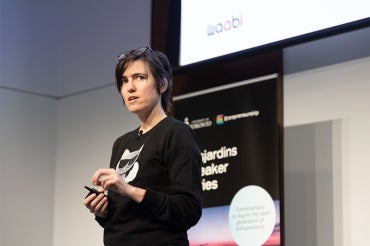Three takeaways from Waabi CEO Raquel Urtasun’s entrepreneurial journey

Published: March 15, 2023
Raquel Urtasun may be a world-leading expert in machine learning and computer vision – but that doesn’t mean she likes to talk about her abilities.
In fact, the CEO of self-driving vehicle company Waabi says she had to overcome her humble nature when trying to convince big-name investors she had the winning formula to transform the self-driving industry.
“You need to say [to venture capitalists] – why you, why this team and why this technology in a way that’s very convincing,” says Urtasun.
The approach worked. Urtasun, a professor in the department of computer science in the University of Toronto’s Faculty of Arts & Science, secured $100 million in initial capital – one of the largest rounds of seed funding in Canadian history. She’s since worked on developing the next-generation of AI-powered technology for self-driving trucks.
She recently spoke about her entrepreneurial journey during a keynote speech at True Blue Impact Day, which marked the culmination of the seventh annual U of T Entrepreneurship Week.
Here are three takeaways from her talk:
Be bold and aim high
As someone who prefers to show others she can do something, Urtasun says she knew that asking for $100 million from a slew of big-name investors would not come naturally.
But she was confident in her detailed plan.
“In front of the venture capitalists, you cannot be humble,” she says. “They will never fund you.”
Urtasun says she made sure to draw a roadmap of how she intended to use the money.
“I didn’t want to worry about fundraising in six or nine months,” she adds. “I wanted the money so we could execute and build this transformational technology.”
Be strategic about your team
Urtasun is the sole founder of Waabi, but she says her team and the investors she’s worked with have been incredibly important in building the company. She adds that she knew from the beginning she wanted to work with investors from the technology and AI sector – including fellow U of T AI luminaries Geoffrey Hinton and Sanja Fidler – because they would better understand Waabi’s mission.
“I think it’s important to have people you can rely on and that have each other’s back,” she says.
The investments from Uber, Khosla Ventures, BDC Capital and others have allowed the company to develop Waabi World, an advanced simulator to test its autonomous vehicles, and Waabi Driver, its first generation of self-driving trucks.
Ignore the competition
“My philosophy is to write a strategy and focus on that,” Urtasun says, adding that it’s important to tune out naysayers.
Case in point: When she first founded the company two years ago, she says she heard people say that she was getting into the self-driving sector “too late.”
“What I heard a lot was ‘everybody’s in this path, what are you doing?’ What I hear today is ‘how did you perfectly time this?’” she says. “And nothing changed, right? I just focused on doing my thing.”



